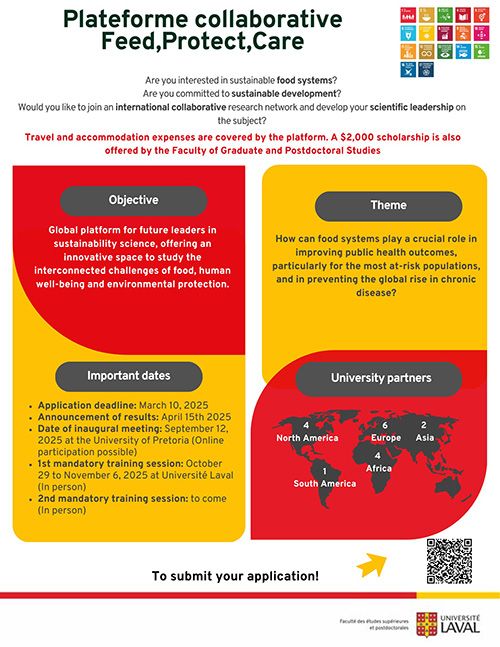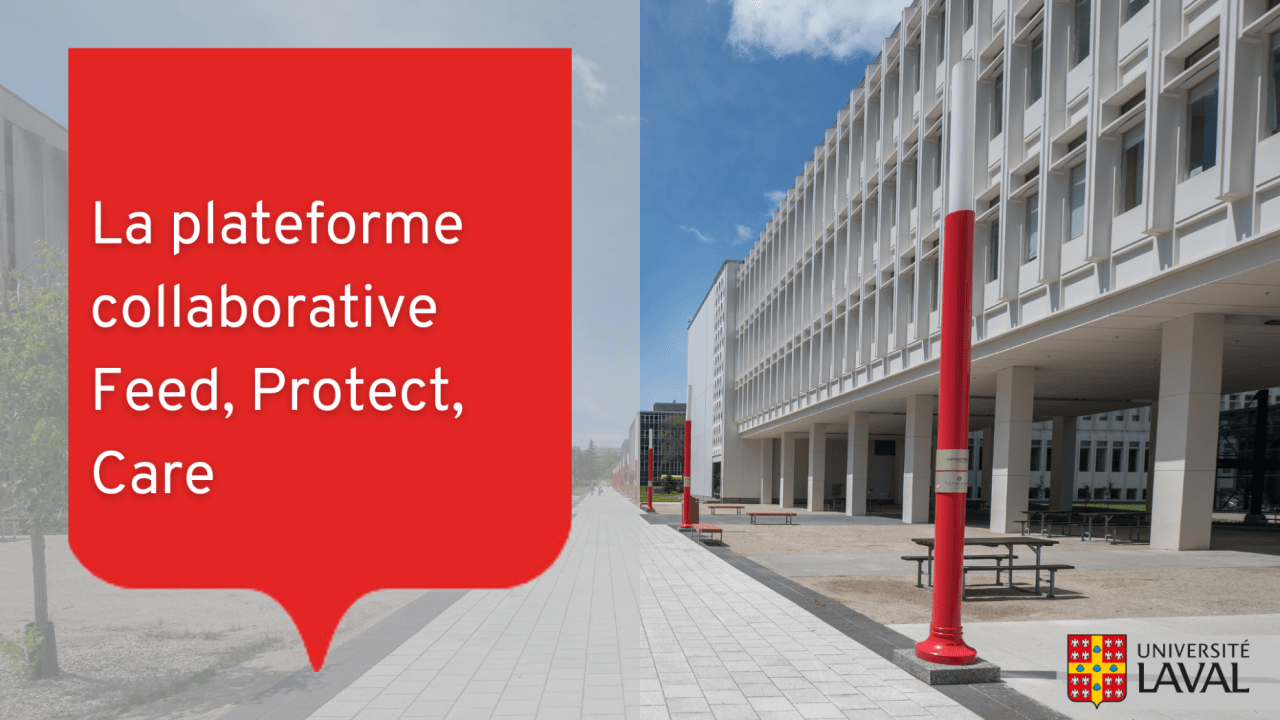Feed, Protect, Care collaborative platform
Are you interested in the topic of sustainable food systems?
Do you demonstrate a commitment to sustainability? Would you like to become part of an international research network and develop your scientific leadership on the subject? Université Laval is pleased to join the international initiative of the Feed, Protect, Care global collaborative PhD platform.
Origin
Arising from a North-South collaboration between the University of Montpellier, the University of Pretoria, and a consortium of partner universities, including Université Laval, this collaborative platform aims to connect and support the next generation of scientists interested in the development of sustainable food systems.
Objective
The Feed,Protect,Care collaborative platform is an innovative international program that :
- Promotes interdisciplinarity, interculturality and exchange
- Offers specialized training in food systems
- Enables international networking
- Develops skills in sustainable development research
- Creates a virtual infrastructure for sharing and collaboration
- Promotes the international visibility of doctoral research.
Governance
The Platform is managed by an International Steering Committee (ISC) made up of one representative from each member institution. This committee is responsible for defining and overseeing the strategic orientations and overall activities of the Platform, meeting at least once a year virtually and at least once every 18 months in person.
Further information
Cohort 2025 - Call for applications

Applications are now open for the second cohort to recruit two more students for the next international field school.
Theme explored
How food systems can play a crucial role in improving public health outcomes, particularly for the most at-risk populations, and in preventing the rise of chronic diseases globally?
Important dates
- Deadline for applications: March 10
- Announcement of selected candidates: Mid-April 2025
- Inaugural meeting: September 12, 2025 at the University of Pretoria (South Africa) - online participation is possible
- First mandatory training session: October 2 to November 6, 2025 at Université Laval (in person)
- Second mandatory training session: in person - upcoming information
Profile required
- The doctoral student's research project is related to various aspects of sustainable food systems.
- Projects may come from diverse backgrounds, e.g. food science, agro-economics, nutrition, food engineering, agronomy, law, administration, political science, public health, and more.This list is not intended to be exhaustive.
- The successful candidate will demonstrate a strong commitment to and interest in sustainable development and transdisciplinarity.
- The international platform's programming is offered entirely in English. Fluency in English is therefore essential.
- The selected candidate is available to participate in the platform for a period of two to three years.
People with parental responsibilities are encouraged to participate. Childcare is provided during training sessions.
FESP invites the academic community to propose diverse candidate profiles and seeks to prioritize an inclusive approach to academic excellence in the selection process.
Participation conditions
The student must already be enrolled in a PhD program at Université Laval and completed at least one year of study.
Travel and accommodation expenses are covered by the platform.
A $2,000 scholarship is also offered by the FESP.
Applying
The application must include:
- A letter of motivation (one-page maximum) outlining one's interest in joining an international research network on the development of sustainable food systems;
- A summary of the candidate’s PhD research project (one-page maximum);
- Research supervisor’s confirmation of the relevance of the student’s PhD topic to the Platform’s theme, as well as the financial capacity to carry out the research project. This confirmation can be provided in the form of a letter or by email;
- Proof of English proficiency (e.g., proof of successful completion of an advanced English course, result of an English language test).
For further information, please contact Sanae Benkaraache: sanae.benkaraache@fesp.ulaval.ca
Cohort 2024 - The platform's first cohort
Developing sustainable food systems
The first two Université Laval students invited to take part in the Feed, Protect, Care collaborative platform are:
- Ariane Barrette, inter-university doctoral student in oceanography
"Taking part in the Platform's Field School gave me a great insight into the benefits of multidisciplinary science and how to make the most of it in the future. One of the highlights was the creation of a close-knit community, which gave us the opportunity to forge lasting bonds that are still present today, and to continue working together even after the school ended."
- Ana Maria Quiroga-Arcila, étudiante au doctorat en biologie végétale, sont
"Taking part in this international Platform's Field School was a very enriching and encouraging experience. This platform paves the way for the creation of a new scientific community, where cultural and disciplinary richness is crucial. The Platform's Field School invited us to get out of the classroom and beyond our comfort zone as young scientists."
The Platform's Field School offers an annual program of international activities, training and events, including the first international PhD Field School in Montpellier, France, in March 2024.
During the first week, theoretical lectures on sustainable food systems and practical field visits immersed participants in the day-to-day challenges of local farmers, city policymakers and Montpellier food stores. This immersive experience enabled them to connect theory with real-world applications, and to come into contact with various (local) stakeholders.
During the second week, doctoral students actively participated in the Journées mondiales de Montpellier, an international event aimed at bridging the gap between science and policy-making. How can research have an impact on the policy-making process, and vice versa? Researchers, (youth) organizations and policy-makers from all over the world attended the conference to discuss how to link science and policy in the future.
The second PhD Field School took place in December 2024 at the School of Agriculture of the University of Sao Paulo, Brazil.
In the event of a discrepancy between the French and English texts, the French version prevails.
